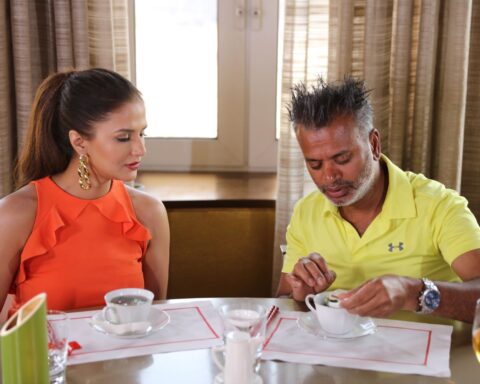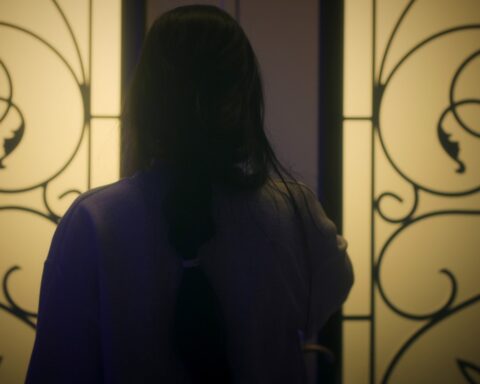The Wall of Shadows
(Poland/Germany/Switzerland, 94 min.)
Dir. Eliza Kubarska
Program: International Spectrum
Every film festival seems to have an obligatory slot reserved for a “mountain movie.” The film can whisk audiences through BC’s Coastal Mountains, climb high through the Alps, or notably, do a free solo ascent of El Capitan. Most often, though, the mountain movies favour the Himalayas. Tales of Sherpas offer thrilling endeavours while stories of young Rinpoches provide a little wisdom in addition to picturesque views. Regardless of the principle subjects’ vocations, though, these mountain movies of the Himalayas increasingly capture a collision of cultures between East and West in films like Sherpa or Sing Me a Song, just to name two. This year’s “mountain movie” at Hot Docs, The Wall of Shadows, stands taller than many of them.
Director Eliza Kubarska injects the film with such gravitas that the stakes loom taller than Everest. This spectacularly shot odyssey depicts a three-member Sherpa family faced with an unenviable dilemma. The son, Dawa, wants to be a doctor, but his father, Ngada, feels the boy should accompany him as a mountain guide to receive immediate pay, rather than incur debts for the family to repay later. Jomdoe, the mother, wants Dawa to pursue his dream rather than risk his life in the same dangerous calling that has claimed too many lives.
Cue a group of ambitious westerners in need of mountain guides. The Wall of Shadows creates a conflict that is twofold when the family learns of the alpinists’ wish. Marcin, a Pole, and Russians Dmitri and Sergiej, want to tackle the east wall of Kumbhakarna Mountain. The job is a serious ask for the Sherpas. Not only has this 7710-metre climb never been conquered, but also the mountain is sacred according to their Kirat faith. To climb the mountain is to heal the family’s financial woes, but to take the job is to desecrate their god.
The tension between the family grows when Ngada inevitably accepts the offer. Dawa and Jomdoe begrudgingly accompany him on the climb. Kubarska captures the tensions of cultural encounters and the power dynamics that shape the Sherpas’ lives, putting all three at risk while denying Dawa his chance to pursue medicine. The climbers vary in their degrees of respecting the Sherpas’ guidance, too, and fissures within the group further complicate the challenges of the expedition. Even Ngada acknowledges that the wall of Kumbhakarna is more difficult and dangerous than Everest, and the conditions of the mountain put the Sherpas at greater risk as they carry the burden of the climbers’ ambitions.
In between the escalating drama of the climb, Kubarska offers haunting interludes that chronicle the folktale about Kumbhakarna’s power. Images of the mountain’s steep faces—dauntingly slippery slopes of slick rock and ice—appear in shots saturated with foreboding dread while a narrator (Rheka Yada) tells the story of three men who thought they could conquer it. Besides foreshadowing the drama to come, the folkloric interludes situate the drama on Kumbhakarna within a longer cycle. This fable is simply one among many in the growing industry of climbing tourism. Unprepared alpinists risk the lives of others in pursuit of high-altitude selfies. If the Sherpas assess the situation and say the climb isn’t worth the risk, as Ngada does here, they face the prospect of going home empty-handed, but at least they escape with their lives.
This small human drama is a wider snapshot of socio-economic variables in a perverted power imbalance between East and West. Every aspect of the climb sees the westerners ask the Sherpas to assign a dollar value to the things they hold dearest: their family, their faith, and their future. Kubarska, an experienced climber whose previous films have taken her to the second highest mountain, K2, and the fjord cliffs of Greenland, captures the drama of the climb from levels both micro and macro.
On one hand, The Wall of Shadows is a mountain movie in its most thrillingly cinematic form as the cameras scale the steep slopes of Kumbhakarna, offering white-knuckler moments of breathtaking awe on par with Free Solo. The risk of the climb is palpable as the film’s spectacular cinematography lets the mountain assert its magnitude and mythical power.
On the other hand, this is a family drama pure and simple. The mountainous landscape all but swallows the Sherpas with the enormity of their dilemma. The all-seeing eye of the camera lets the drama loom over the Sherpas with the shadow of the mountain. It sees every minute detail, like Jomdoe muttering her disgust at the situation or the tourists rolling their eyes when Ngada requests some of their goat meat because the monk who accompanied needs a sacrifice to offer to the mountain. The climbers don’t take the blessing seriously and view the ceremony as another delay spoiling their holiday.
“This film is not about climbing,” scoffs Dmitri to Sergiej in one candid exchange. “It is about people.” Kubarska, however, knows that the grandeur of the mountain is but a hill of beans compared to the human drama in the camp. The film is all the better for it.
The Wall of Shadows screens at Hot Docs’ online festival









